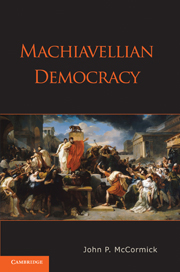Book contents
- Frontmatter
- Contents
- Preface
- Abbreviations for Machiavelli's Writings
- Introduction: Liberty, Inequality, and Popular Government
- PART I
- PART II
- 3 The Benefits and Limits of Popular Participation and Judgment
- 4 Elections, Lotteries, and Class-Specific Institutions
- 5 Political Trials and “the Free Way of Life”
- PART III
- Notes
- Acknowledgments
- Works Cited
- Index
3 - The Benefits and Limits of Popular Participation and Judgment
Published online by Cambridge University Press: 05 June 2012
- Frontmatter
- Contents
- Preface
- Abbreviations for Machiavelli's Writings
- Introduction: Liberty, Inequality, and Popular Government
- PART I
- PART II
- 3 The Benefits and Limits of Popular Participation and Judgment
- 4 Elections, Lotteries, and Class-Specific Institutions
- 5 Political Trials and “the Free Way of Life”
- PART III
- Notes
- Acknowledgments
- Works Cited
- Index
Summary
I declare that a people is more prudent, more stable and judges better than a prince.
Machiavelli, Discourses I.58The people, when deceived by a false notion of the good, often desires its own ruin.
Machiavelli, Discourses I.53Machiavelli's prescriptions for a widely inclusive and popularly empowered form of government rest on a remarkably favorable assessment of the common people's abilities, especially their capacity for political judgment. In previous chapters, I accentuated Machiavelli's arguments concerning the people's humor not to be dominated and demonstrated how these arguments undergird his case for democratic republics or governi larghi. In this chapter, I examine Machiavelli's arguments in favor of popular judgment and his various engagements with the serious criticisms of the people's capacities voiced by advocates of principalities or oligarchic republics. Machiavelli identifies at least three arenas in which the people exercise better judgment than do any other political actors, specifically, princes and the few: deciding political trials, appointing magistrates, and creating legislation.
Virtually every aristocratic critic of the people denies the latter authority to decide political trials, and most of them strongly advise against granting the people direct judgment over legislation. In general, such critics, when countenancing any popular participation at all, confine such participation to the appointment of magistrates through general elections. Beyond endorsing the popular election of public officials, however, Machiavelli also recommends widely participatory, substantively deliberative procedures through which the people refine their judgments over both political prosecutions and the law.
- Type
- Chapter
- Information
- Machiavellian Democracy , pp. 65 - 90Publisher: Cambridge University PressPrint publication year: 2011

